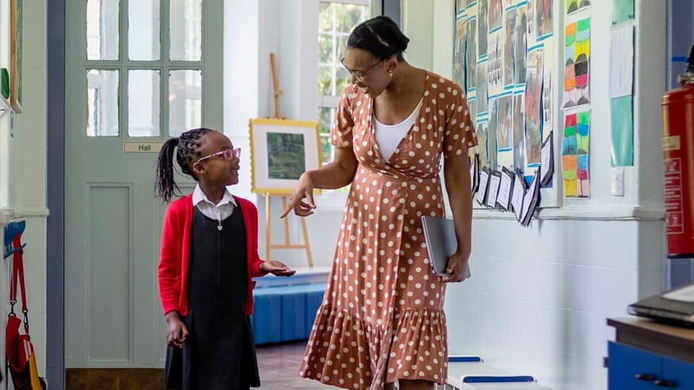Explore our resources for social work degrees and learn about career options that fit your future.

When a person is considering earning a college degree — whether immediately after high school or later in life — choosing a major is a major decision, no pun intended. Some will follow a parent’s career choice; others will be drawn to promises of big paydays and material security.
For others, the goal is more personal. As John F. Kennedy once said, “One person can make a difference, and everyone should try.”
That mindset points to a career in social work. Social workers help people solve and cope with problems in their everyday lives.
In this blog, let’s help answer the question “Why become a social worker?” We’ll get into some background, personality traits that fit the profession, career options, and more. Plus, we’ll hear from a few social work professionals about experiences in their careers.
Understanding the Profession of Social Work
According to the NASW, social workers assist people by helping them cope with issues in their everyday lives, deal with relationships, and solve personal and family problems.
Social work differs from other counseling professions in its focus on both the person and their environment. It recognizes how external factors such as unemployment or family conflict can impact a person’s situation. Taking those factors into account, social workers use assessment and intervention to help clients cope with their situation, helping to change it, if needed.
Social work is also rooted in a commitment to advocating for those in need. Social justice is the goal, and social workers are champions for the rights of individuals and communities, whether at a local level of community organizing or lobbying on a state or national political scale. Social workers provide direct services and counseling, and they connect people with needed resources.
A Broader Career Spectrum
When considering a social work career, potential students need to move past preconceptions of the field. People often think of social workers as working primarily with child welfare and poverty alleviation; but the scope of social work is much broader than that. Depending upon your goals, you’ll need a bachelor’s degree, possibly a master’s, and potentially a doctoral degree. Regardless of your education level, your career options are much wider than you may assume.
Here's a sampling of employment options for social workers:
- Child Welfare: In cases of neglect or abuse, social workers protect children and support families.
- Aging: With an eye on protecting the dignity of elderly clients, social workers connect older adults with services.
- Mental Health Clinical Social Work: Clinical social workers provide mental health counseling and services, particularly to underserved populations.
- Healthcare: Social workers help patients cope with illness and act as an ally in navigating the healthcare system.
- Advocacy and Community Organizing: Social workers can organize locally to improve conditions in neighborhoods, striving for social justice.
- Policy and Planning: Social workers can make effective lobbyists, proposing legislation based on their experience with social problems and needs.
- School Social Work: These social workers act as the liaison between schools, homes, and communities on behalf of student needs.
- Public Welfare: Social workers are involved in planning and administering various public health initiatives, typically at the local level.
- Military Social Work: This specialization focuses on providing the necessary support and interventions needed by members of the military, veterans, and spouses and dependents.
For an exhaustive list of possible social work career specializations, check out this compilation from the Indeed job posting site.
Social work is also a great training ground for other careers. If you’ve been a practicing social worker and seek to make a career change, or if you’re simply burned out, the skills you learn as a social worker translate well into other careers.
The Personality Traits Needed to Be a Social Worker
When asking yourself “Why choose a career in social work?” you need to first consider if your personality matches the job. Probably the most trusted and well-known indicator of this is the famous Myers-Briggs Type Indicator, a test that uses dozens of questions to narrow personality into 16 “personality types.” Of those 16, these are the five best personality type matches for social workers.
Here are some of the most important traits for a social worker:
- Empathy — The most crucial trait. You need to be able to understand, relate to, and share the feelings of your clients.
- Communication Skills — Communication with diverse individuals and groups is a part of the job every day.
- Patience — Clients won’t always respond to your attempts at addressing their problems, and you’ll need to be patient as you work to earn their trust.
- Flexibility — No two clients are the same; nor are any two cases or situations. Social workers need to be able to adapt.
- Passion — This is a career for those devoted to helping others. The desire to go the extra mile for your clients must come from within.
- Creativity — Navigating client needs and the system can be challenging. Thinking creatively can make the difference between getting needs met or running into a dead end.
- Resilience — Social workers are put in emotionally draining situations. The ability to bounce back from these and continue the work is a necessary skill.
- Organization — Caseloads, paperwork, varying clients. This isn’t a job for disorganized people who can’t handle the details.
- Cultural Intelligence — Understanding, relating to, and respecting different cultures and perspectives is a must for any social worker.
3 Personal Social Work Stories
When considering a career, it’s wise to seek out counsel from those already in the field. Now that you have some of the background on what it takes to be a social worker, let’s hear from three practitioners who came to the field from different perspectives.
Trauma Leads to Social Work
For Dr. Kim Bundy-Fazioli, a serious car accident and the subsequent time in intensive care and then rehabilitation led her to consider social work.
“It was during this time at home, convalescing, that I began to sort through what I wanted for myself,” she recalls. “That’s when social work entered the picture.”
With so much down time, her mind went back to the divorce of her parents when she was a child. It was a traumatic situation, and Bundy-Fazioli didn’t have anyone to talk to about it. That’s when she realized she could help children in similar situations who needed comfort and guidance. Hello, social work!
“I had never met a social worker,” Bundy-Fazioli says. “But I understood the pain and grief of a family torn apart. I was compelled to learn more and help those who were underserved and struggling.”
Years later, after graduating with a Master of Social Work degree, Bundy-Fazioli’s first job involved working in a girls’ residential facility in upstate New York. The facility housed 30 girls ages 13 to 17 who were placed out-of-home due to issues such as childhood abuse, sexual abuse, and neglect.
“That job was and continues to be the foundation of my career,” she says.
Lifetime of Social Work and Learning
Most people attending UMass Global can be classified as “nontraditional students.” But Bill Kieffer was nontraditional even amongst nontraditional students. Joining the Air Force at age 35, he’d already earned a master’s degree and a Ph.D. in social work. It was his passion for social work that prompted him to enlist.
“I saw the opportunity that the Air Force had for clinical social work,” he says. “I loved that I could work in my profession, serve my country, and see the world. What an opportunity!”
After two decades with the Air Force, Kieffer retired. When he found out he still qualified for education benefits from his time in the military, the lifelong learner excitedly headed back to school. UMass Global’s history of providing educational support to military service members appealed to Kieffer.
As he works toward a second bachelor’s degree in applied studies with a minor in organizational leadership, Kieffer has been enjoying courses in criminal justice and history — subjects that have supplemented his extensive social work experience. Today, he is a deacon at St. Michael’s Catholic Parish at Travis Air Force Base. He also works with families who are dealing with criminal justice or gang-related issues.
“There’s nothing more effective than getting an education in a field you’re interested in and passionate about,” Kieffer says. “Online education from UMass Global is a treasure just waiting for people to take advantage of.”
The Variety of Social Work
For Dr. Ellen Belluomini, associate professor of social work at UMass Global, it was the variety of potential work that drew her to social work.
“My personality type craves challenges, being creative and having the ability to make an impact,” she explains. “I get bored easily.”
Dr. Belluomini wanted a career that could adapt to her evolving interests. The diverse settings and options for social work was very appealing, leading her to earn her bachelor’s, master’s, and doctoral degrees in social work.
She began her career in an entry-level position, working overnight shifts as a counselor at an inpatient drug program for women and their children. That progressed to a supervisory role. From there, Dr. Belluomini challenged herself by transitioning to different leadership positions throughout varying social work fields. She enjoys that her career can evolve as she changes and grows.
“Social work never ceases to provide all the challenges I need to be fulfilled,” she says. “Social work is not just a job — it’s my career and my passion. Not many people can say that about their work.”
Interested in Becoming a Social Worker?
OK, now you understand what social workers do. You’ve learned that the career options are much broader than you may have assumed —everything from working with children to building a clinical practice to lobbying politicians on behalf of those in need. And you know the personality traits that make for a great social worker.
That answers the “Why social work?” question. Now it’s up to you. Want to make a difference in the world? Social work allows you to do just that.
UMass Global offers a Bachelor of Arts in Social Work, a Master of Social Work, and will soon be offering a Doctor of Social Work. Curious? Here’s a great place to start your social work exploration. With 100 percent online coursework, combined with in-person fieldwork, UMass Global is proud of our commitment to training excellent social workers to meet the growing need in our society.
Ready to take the next step? Let’s talk. Call us at (800) 746-0082 to connect with an Enrollment Coach.








